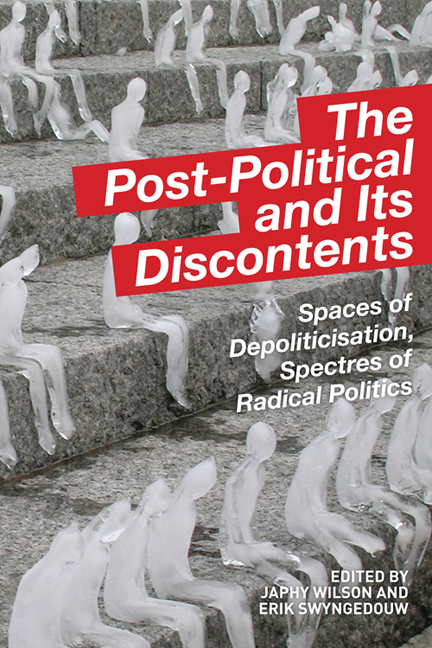Book contents
- Frontmatter
- Contents
- List of Contributors
- Seeds of Dystopia: Post-Politics and the Return of the Political
- Part I Spaces of Depoliticisation
- 1 The Post-Politics of Sustainability Planning: Privatisation and the Demise of Democratic Government
- 2 The Post-Political and the End of Nature: The Genetically Modified Organism
- 3 The New Development Architecture and the Post- Political in the Global South
- 4 Opening Up the Post-Political Condition: Multiculturalism and the Matrix of Depoliticisation
- 5 The Jouissance of Philanthrocapitalism: Enjoyment as a Post-Political Factor
- 6 Religious Antinomies of Post-Politics
- 7 Post-Ecologist Governmentality: Post-Democracy, Post- Politics and the Politics of Unsustainability
- Part II Spectres of Radical Politics
- There Is No Alternative
- Index
2 - The Post-Political and the End of Nature: The Genetically Modified Organism
from Part I - Spaces of Depoliticisation
Published online by Cambridge University Press: 05 August 2016
- Frontmatter
- Contents
- List of Contributors
- Seeds of Dystopia: Post-Politics and the Return of the Political
- Part I Spaces of Depoliticisation
- 1 The Post-Politics of Sustainability Planning: Privatisation and the Demise of Democratic Government
- 2 The Post-Political and the End of Nature: The Genetically Modified Organism
- 3 The New Development Architecture and the Post- Political in the Global South
- 4 Opening Up the Post-Political Condition: Multiculturalism and the Matrix of Depoliticisation
- 5 The Jouissance of Philanthrocapitalism: Enjoyment as a Post-Political Factor
- 6 Religious Antinomies of Post-Politics
- 7 Post-Ecologist Governmentality: Post-Democracy, Post- Politics and the Politics of Unsustainability
- Part II Spectres of Radical Politics
- There Is No Alternative
- Index
Summary
The close of ‘the short twentieth century’ in 1991 (Hobsbawm 1994) was followed by a deluge of proclaimed endings – of history, of nature, of politics – and even, some argued, of endings themselves. Later on in the same decade Bruno Latour (1999) caught the spirit of the moment when he proclaimed that society had moved beyond the age of revolutions, and that modes of succession have become replaced by modes of coexistence. In this chapter we take one emblematic technology of that period – the genetically modified organism (GMO) as deployed in agricultural biotechnology – and use it to explore this complex moment at the end of the twentieth century. The emergence of a neoliberal global order in the 1990s had substituted technological progress for the agonistic struggles of history. However, in the story of GM crops and the ‘biotech revolution’, we find that this neutralised technological agenda became challenged and obstructed. In this situation, those attempting to govern the GM controversy in the European Union of the early twenty-first century resorted to rhetorics and regimes of ‘coexistence’ between parallel agro-food socio-technical systems. Here, instead of the triumphant succession of one technological and social system over another, it was suggested that three separate agro-food systems – GM agriculture, ‘conventional’ industrial agriculture, and organic alternatives – could and should ‘coexist’ in the same time-space. Tropes of progress in time became eclipsed by ones of coexistence in space, as capitalism tried to establish a new spatio-temporal fix (Jessop 2006). For the public controversy around GM food, the enabling of consumer choice through labelling represented the dissolution of political antagonisms over ‘the environment’ into apparently mutually compatible and individualised market choices. At the same time, a new machinery of public participation attempted to incorporate opposition within consensual regimes, through government-sponsored events like ‘GM Nation?’ (Reynolds and Szerszynski 2007). In the architecture of this ‘deliberative’ process the opinions of ‘engaged publics’ who attended events were ‘balanced’ by neutralised samplings of a ‘general public’ constructed as dispassionate and uncommitted – and therefore somehow more legitimate (Reynolds 2013). Regimes of choice, consensus and coexistence were thus deployed to defuse the strange and complex political charge that was building up around GM crops and foods.
- Type
- Chapter
- Information
- The Post-Political and Its DiscontentsSpaces of Depoliticisation, Spectres of Radical Politics, pp. 48 - 66Publisher: Edinburgh University PressPrint publication year: 2014



